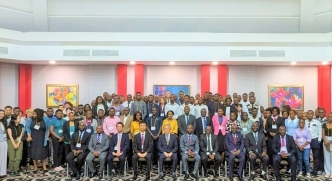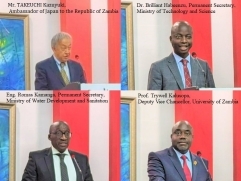Kick-Off Symposium of the SATREPS Project “Risk-based Participatory WASH Planning and Citizen-data WASH Statistics for African Peri-urban Settlements (SPLASH Project)”
2024/9/25



On 24th September 2024, Ambassador Takeuchi attended the Kick-Off Symposium of the SATREPS Project “Risk-based Participatory WASH Planning and Citizen-data WASH Statistics for African Peri-urban Settlements (SPLASH Project)”.
This project, funded by the Japanese government with a grant of approximately 2 million US dollars (300 million Japanese yen) , will be implemented over the next five years from 2024. In Zambia, diarrhoeal diseases, particularly cholera, have become a serious public health issue. The cholera outbreak that began late last year and continued through early this year has resulted in over 700 deaths and more than 20,000 infections, with Lusaka being the hardest hit. The project aims to improve water and sanitation conditions in peri-urban areas (compounds) of the city of Lusaka by encouraging behavioural change among residents through visualisation of diarrhoeal risks, with the ultimate goal of developing water and sanitation improvement plans.
The symposium was attended by over 300 participants, including Dr. Brilliant Habeenzu, Permanent Secretary of the Ministry of Technology and Science, Eng. Romas Kamanga, Permanent Secretary of the Ministry of Water Development and Sanitation, Prof. Trywell Kalusopa, Deputy Vice Chancellor of the University of Zambia, Mr. Victor Kagoli, Director - Public Health of the Lusaka City Council, Associate Prof. HARADA Hidenori of Kyoto University (Project Leader), Dr. Kawawa Banda, Integrated Water Resource Management Centre of theUniversity of Zambia (Project Leader), as well as representatives from Hokkaido University and Tohoku University. During the symposium, participants shared insights into the history of WASH (Water, Sanitation, and Hygiene) improvements in Japan, as well as the current WASH situation in Lusaka. They also discussed the project’s overall vision, its implementation strategies, and the roles of the various institutions involved, reaffirming the commitment of all project members to collaborate towards achieving its goals.
Ambassador Takeuchi expressed his condolences to those affected by the recent cholera outbreak and stated that he is confident the project will contribute to improving Zambia’s water and sanitation infrastructure, preventing further cholera outbreaks, and promoting healthier and more resilient communities. He also noted that this year marks the 60th anniversary of the establishment of diplomatic relations between Japan and Zambia, a milestone year, and expressed his hope for continued cooperation between the two nations, as well as the success of the project.
To read the speech by Ambassador Takeuchi, please click here.
